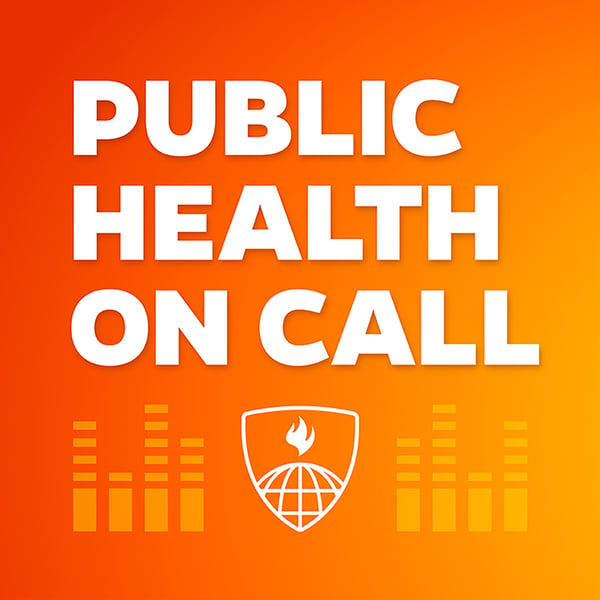911 - Book Club—We Are Eating The Earth: The Race to Fix Our Food System
Public Health On Call
The Johns Hopkins Bloomberg School of Public Health
4.8 • 620 Ratings
🗓️ 25 June 2025
⏱️ 18 minutes
🧾️ Download transcript
Summary
About this episode:
Growing and producing our food comes at an extreme cost to the environment. In this episode: a conversation about climate and agriculture with journalist and author Michael Grunwald, whose blunt new book looks at how the food system is wiping out wetlands, forests, and other carbon reservoirs that protect us from global warming.
Guest:
Michael Grunwald is a journalist and author who covers public policy. He’s written for Politico Magazine, The Boston Globe, and Washington Post, and Time. His new book is We Are Eating The Earth: The Race to Fix Our Food System.
Host:
Dr. Josh Sharfstein is vice dean for public health practice and community engagement at the Johns Hopkins Bloomberg School of Public Health, a faculty member in health policy, a pediatrician, and former secretary of Maryland’s Health Department.
Show links and related content:
-
A Food Reckoning Is Coming—The Atlantic
-
Changing How We Grow Our Food—The New York Times (Opinion)
Transcript information:
Looking for episode transcripts? Open our podcast on the Apple Podcasts app (desktop or mobile) or the Spotify mobile app to access an auto-generated transcript of any episode. Closed captioning is also available for every episode on our YouTube channel.
Contact us:
Have a question about something you heard? Looking for a transcript? Want to suggest a topic or guest? Contact us via email or visit our website.
Follow us:
-
Here's our RSS feed
Note: These podcasts are a conversation between the participants, and do not represent the position of Johns Hopkins University.
Transcript
Click on a timestamp to play from that location
| 0:00.0 | Welcome to Public Health On Call, a podcast from the Johns Hopkins Bloomberg School of Public |
| 0:04.9 | Health, where we bring evidence, experience, and perspective to make sense of today's |
| 0:10.6 | leading health challenges. |
| 0:16.0 | If you have questions or ideas for us, please send an email to Public Health Question at jhhu.edu. That's public health question at jhhu.edu for future podcast episodes. Hi listeners, it's Lindsay Smith Rogers. Today, climate and agriculture. Michael Grenwald is a journalist and award-winning author with a |
| 0:39.7 | provocative new book entitled We Are Eating the Earth. He joins Dr. Josh Sharfstein to talk in his own |
| 0:46.8 | blunt style about the challenge of feeding the planet without wiping out the wetlands, forests, |
| 0:52.5 | and other carbon reservoirs that protect us from global warming. |
| 0:56.3 | Let's listen. |
| 0:57.3 | Mike Runwell, thank you so much for joining me today on Public Health on Call to talk about your book, We Are Eating the Earth. |
| 1:04.0 | This is not the usual book on climate change that is going to focus on energy. |
| 1:08.8 | This book is all about food and whether or not our way of making food is sustainable for our planet. |
| 1:15.8 | And it was fascinating to read because I thought initially that when people talk about climate, they're usually talking about energy. |
| 1:23.2 | They're talking about getting rid of fossil fuels. But you're talking about food. Why is that? |
| 1:28.7 | Well, thanks so much for having me, Josh. And honestly, I felt the same way. I was, as you know, |
| 1:33.8 | I was a reporter at the Washington Post at Time Magazine, at Politico magazine. And I wrote a lot |
| 1:38.7 | about energy and climate. And I realized I was spectacularly ignorant about the food part of the problem. But food is a third of the problem. And it's about 1% of the conversation and 3% of the money. So I'm hoping we can start to grapple with this stuff. So lay out the argument. If I'm very devoted to electrifying the economy, switching out of fossil fuels. How do you get my attention to say it might actually be what we're all eating that is a huge part of the problem we have to solve? |
| 2:08.7 | Well, it's true. Energy is still two-thirds of the problem, right? But the good news is at least we know what to do about energy. You know, you got to electrify the global economy and start using clean electricity to run it. And we are actually starting to do about energy. You know, you've got to electrify the global economy and start using |
| 2:18.0 | clean electricity to run it. And we are actually starting to do that a little bit. And if you're |
| 2:22.8 | building a power plant today, it's probably wind or solar. Food, on the other hand, you know, |
| 2:28.1 | we don't know what to do and the problem's getting worse. And the basic problem is that |
| 2:33.0 | we're eating the earth, right? I mean, yes, |
| 2:35.6 | we have diesel tractors and crop dusters have some carbon emissions. The burping cows have some methane |
... |
Please login to see the full transcript.
Disclaimer: The podcast and artwork embedded on this page are from The Johns Hopkins Bloomberg School of Public Health, and are the property of its owner and not affiliated with or endorsed by Tapesearch.
Generated transcripts are the property of The Johns Hopkins Bloomberg School of Public Health and are distributed freely under the Fair Use doctrine. Transcripts generated by Tapesearch are not guaranteed to be accurate.
Copyright © Tapesearch 2025.

